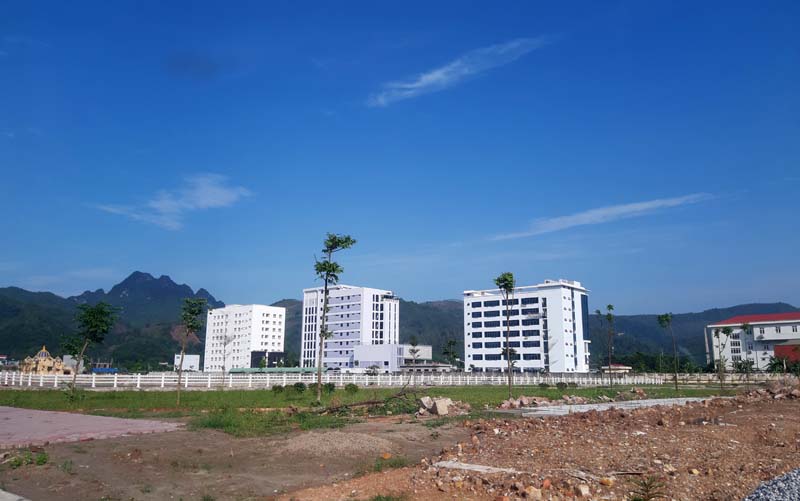
(HBO) - The urbanisation rate in Hoa Binh province reached 28.69 percent as of June 2020, up 14.16 percent from the start of the current tenure (2015-20) of the provincial Party organisation.
The achieved rate surpassed the target set by the resolution
of the 16th congress of the provincial Party organisation and the
socio-economic development plan for 2016-20 by 114.76 percent.
 Quynh Lam centre,
which is under construction, is hoped to improve urban landscape of Hoa Binh
city.
Quynh Lam centre,
which is under construction, is hoped to improve urban landscape of Hoa Binh
city.
The target of a 25-percent urbanization rate by 2020 was
initially considered one of the five most difficult targets set in the
resolution of the 16th provincial Party congress.
The rate was 71.46 percent in Hoa Binh city, 40.8 percent in
Luong Son district and 25.06 percent in Lac Thuy, 18.7 percent in Mai Chau,
17.73 percent in Yen Thuy, 17.95 percent in Tan Lac and 17.73 percent in Da
Bac.
Meanwhile, in the districts of Cao Phong, Kim Boi and Lac
Son, the rate stood at 15 percent, 12.01 percent and 8.65 percent,
respectively.
The success of the work is attributable to the specific guidelines
and close supervision of the provincial Party Committee and the People’s
Committee, along with efforts of relevant agencies, the political system in the
implementation of urban development solutions in tandem with administrative
unit re-arrangement./.
Hoa Binh province is undergoing a dynamic transformation amid Vietnam’s national digital transition. Building on Poliburo’s Resolution No. 57-NQ/TW on breakthroughs in science, technology, innovation, and national digital transformation, the province has rolled out a wide range of practical action plans. A standout initiative is the "Digital Literacy for All” movement, an effort to ensure that no one is left behind in the digital era.
Hoa Binh province is undergoing a dynamic transformation in the wake of the national digital transformation movement. Building on Resolution No. 57-NQ/TW of the Politburo on breakthroughs in science, technology, innovation, and national digital transformation, the province has implemented a wide range of practical action plans. A standout initiative is the "Digital Literacy for All” movement ambitious effort to ensure that no one is left behind in the digital age.
With a spirit of unity and proactive problem-solving, the Party Committee, the government and the people of Dong Lai Commune (Tan Lac District) have made great strides in implementing the resolutions of the 24th Party Congress of the commune for the 2020 - 2025 term. Focusing on leadership and practical actions, the commune has brought the Party’s resolutions into daily life, creating strong impacts and pushing the local development forward.
Amid the nationwide push for digital transformation, young people in Hoa Binh Province are stepping up as dynamic pioneers, applying technology to enhance Youth Union operations and expand the reach of youth-led initiatives. Through creativity and adaptability, Youth Union organizations at all levels have introduced a series of practical solutions, contributing to modern governance and community development.
In recent years, An Nghia commune, located in Lac Son district, has stepped up administrative reform, focusing on improving the quality and efficiency of its single-window service unit for receiving and processing administrative procedures. These improvements have helped create favourable conditions for local residents and organisations to handle administrative procedures, contributing to the commune’s broader socio-economic development.
The Prime Minister-approved master plan to develop the multi-use value of forests ecosystems through 2030, with a vision to 2050, aims to improve the management and sustainable use of forest resources, create jobs, increase incomes, and improve the living standards of ethnic minorities, people in mountainous and remote areas, forest workers and those living near forests.



 Quynh Lam centre,
which is under construction, is hoped to improve urban landscape of Hoa Binh
city.
Quynh Lam centre,
which is under construction, is hoped to improve urban landscape of Hoa Binh
city.